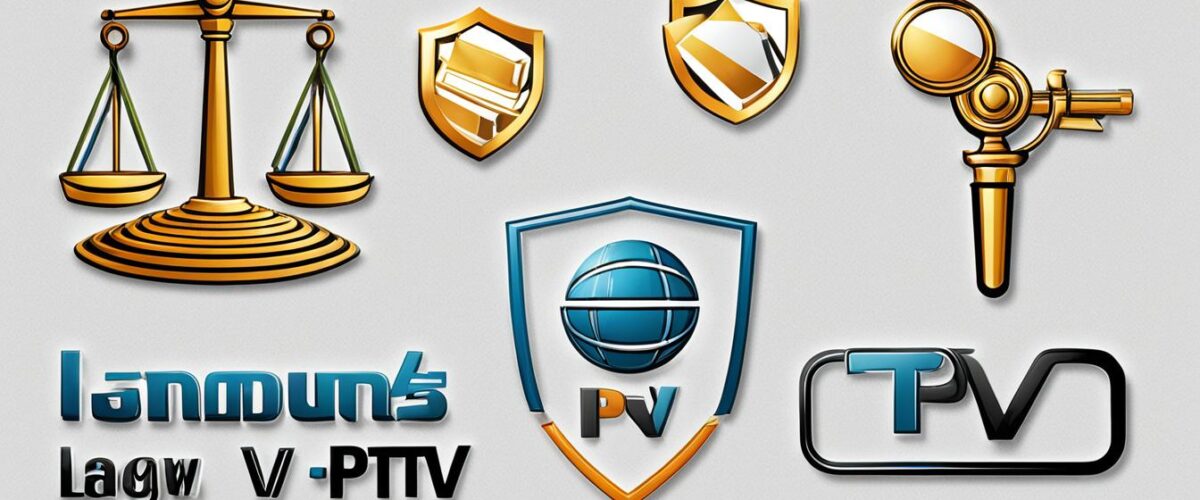Did you know that the global revenue generated by the Internet Protocol Television (IPTV) industry is projected to reach $117.07 billion by 2027?
IPTV has revolutionized the way we consume television content, offering the flexibility to watch shows and movies on demand. However, it’s essential to understand the legal aspects surrounding IPTV to ensure you’re supporting legal providers and avoiding any potential legal issues.
Key Takeaways:
- Legal IPTV services obtain the necessary licenses to distribute copyrighted content and comply with IPTV regulations.
- Illegal IPTV services offer copyrighted content without authorization, infringing on copyright and intellectual property rights.
- Using illegal IPTV services can lead to legal ramifications, including fines and potential imprisonment.
- Choosing legal IPTV providers supports the entertainment industry and ensures a safe and compliant viewing experience.
- Users should be cautious of signs of illegal IPTV, such as low subscription fees or payment in cryptocurrencies.
What is IPTV and How Does it Work?
IPTV, short for Internet Protocol Television, is a revolutionary technology that enables the delivery of television content over the internet using IP technology. Unlike traditional television broadcasting methods, IPTV allows users to access their favorite TV shows and movies on demand, breaking free from the limitations of scheduled programming.
IPTV services operate by converting television content into IP packets and storing them on servers. When a user requests specific content, the IPTV provider retrieves and delivers the corresponding IP packets to the user’s device, whether it’s a TV, smartphone, tablet, or laptop. This seamless delivery of content ensures that users can enjoy their favorite programs anytime and anywhere.
There are various IPTV providers available in the market, offering a wide range of content options to cater to different interests and preferences. These providers offer services such as live TV streaming, video on demand (VOD), and time-shifted TV, allowing users to watch their favorite shows at their convenience.
With IPTV, users have the flexibility to choose from different formats based on their viewing habits. Whether they prefer live TV for real-time updates, on-demand content for binge-watching, or time-shifted TV to watch recorded shows, IPTV provides a personalized and user-friendly experience.
The Advantages of IPTV Technology
IPTV technology offers several advantages over traditional broadcast methods:
- Wide range of content options: IPTV services provide access to a vast library of TV shows, movies, documentaries, and more, catering to diverse interests and preferences.
- Flexibility and convenience: With IPTV, users can watch their favorite content at their preferred time and on their preferred devices, eliminating the need to adhere to fixed schedules.
- High-quality streaming: IPTV enables high-definition streaming, allowing users to enjoy their favorite shows and movies in superior visual and audio quality.
- Global reach: Users can access IPTV services from anywhere in the world, as long as they have an internet connection, making it ideal for travelers and expatriates.
- Interactive features: IPTV services often come with interactive features like video recording, pause and rewind, and interactive program guides, enhancing the overall viewing experience.
Overall, IPTV technology revolutionizes the way we consume television content, offering a flexible, convenient, and personalized viewing experience. Whether it’s streaming live TV, catching up on missed episodes, or exploring a vast library of on-demand content, IPTV provides a new level of convenience and choice for entertainment enthusiasts.
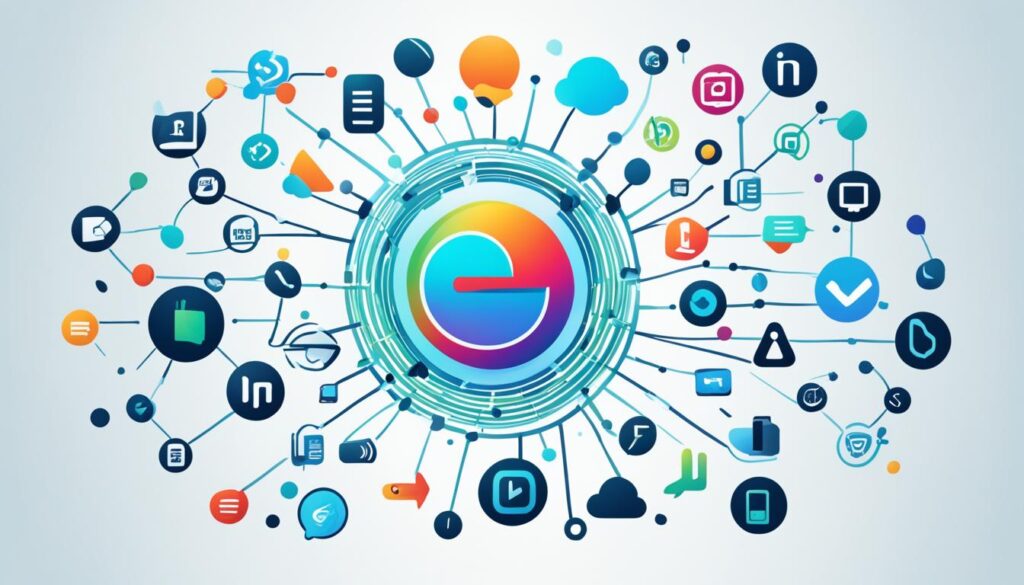
Legal IPTV Providers vs. Illegal IPTV Services
When it comes to IPTV services, it’s crucial to understand the distinction between legal providers and illegal services. Legal IPTV providers operate within the bounds of copyright laws and have the proper licenses and authorizations to distribute copyrighted content. These providers prioritize adherence to regulations and respect intellectual property rights.
Conversely, illegal IPTV services offer access to copyrighted content without authorization, infringing on copyright and intellectual property rights. These services obtain content illegally and without the necessary licensing, exposing users to legal consequences and undermining the creators and rights holders of the content.
Choosing legal IPTV providers is not only a responsible choice but also helps support the entertainment industry and ensures that content creators are rightfully compensated for their work. By opting for legal services, users can enjoy their favorite TV shows, movies, and other content without the risk of copyright infringement.
It’s important for users to thoroughly research and select reputable legal IPTV providers to ensure a safe and compliant viewing experience. By supporting legal sources, users contribute to a thriving and sustainable industry while also enjoying a wide range of high-quality content.
Benefits of Legal IPTV Providers
Legal IPTV providers offer numerous benefits that enhance the user experience:
- Access to a vast library of licensed content
- High-quality streaming with reliable service
- Support for content creators and rights holders
- Peace of mind knowing the service is compliant with copyright laws
- Regular updates and new releases
Drawbacks of Illegal IPTV Services
Using illegal IPTV services exposes users to various risks and drawbacks:
- Violation of copyright laws and intellectual property rights
- Potential legal consequences, including fines and legal action
- Unreliable service with inconsistent streaming quality
- Inadequate customer support and lack of updates
- Contributing to the piracy and undermining the entertainment industry
Legal IPTV Providers vs. Illegal IPTV Services
| Aspect | Legal IPTV Providers | Illegal IPTV Services |
|---|---|---|
| Content Availability | Wide range of licensed content | Access to unauthorized, pirated content |
| Quality and Reliability | Consistent streaming quality and reliable service | Unreliable service with inconsistent streaming quality |
| Legal Implications | Compliance with copyright laws and intellectual property rights | Potential legal consequences, including fines and legal action |
| Support for Creators | Directly supports content creators and rights holders | Undermines the entertainment industry and reduces earnings for creators |
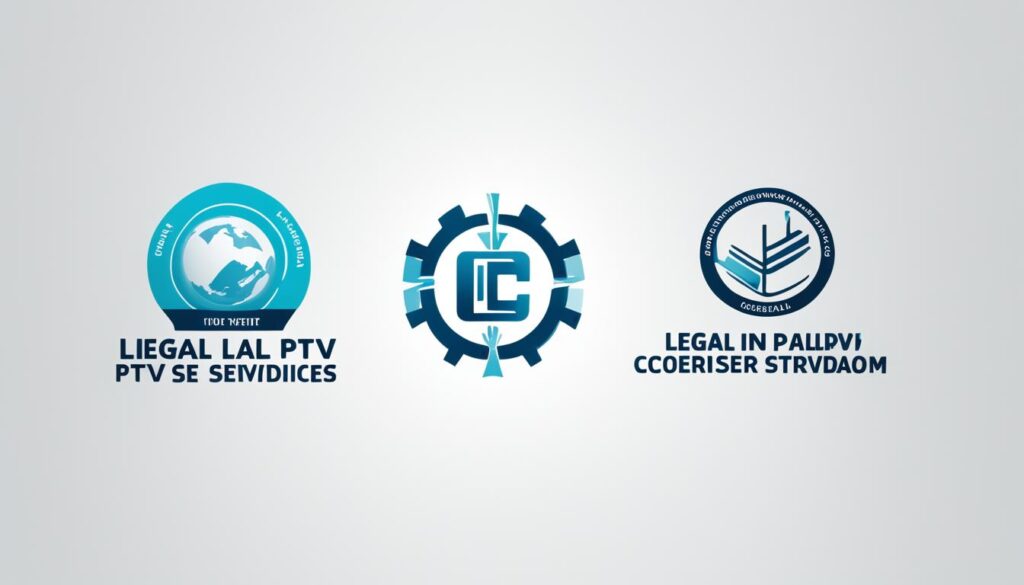
Choosing a legal IPTV provider ensures a reliable, high-quality streaming experience while supporting the entertainment industry and respecting intellectual property rights. By avoiding illegal IPTV services, users can contribute to a thriving and sustainable ecosystem that benefits both content creators and consumers.
Laws Surrounding Illegal IPTV
Different countries have their own laws surrounding illegal IPTV. Understanding these laws is essential to avoiding legal ramifications related to copyright infringement and unauthorized streaming.
In the United Kingdom, the Digital Economy Act imposes stricter punishments for copyright infringement. Offenders may face potential prison sentences of up to 10 years, emphasizing the seriousness of violating IPTV laws (IPTV laws). This acts as a strong deterrent to illegal streaming.
In the United States, the Digital Millennium Copyright Act (DMCA) safeguards the rights of content creators and enforces penalties and fines for providing copyrighted content without proper licensing (copyright infringement). While streaming was previously a legal loophole under the DMCA, a recent law has closed this gap, making illegal streaming a felony offense, punishable by severe consequences and fines (felony streaming).
In Canada, copyright holders are allowed to distribute warning notices to suspected users of illegal IPTV. Recent changes, however, have curtailed the demands for settlements, reducing the potential legal implications for users (legal ramifications).
It is crucial for users to familiarize themselves with the laws surrounding illegal IPTV in their respective countries. By adhering to these laws, users can avoid legal troubles and support the entertainment industry’s efforts to protect intellectual property rights and combat unauthorized streaming.
Table:
| Country | Relevant IPTV Laws |
|---|---|
| United Kingdom | Digital Economy Act imposes tough punishments for copyright infringement, with potential prison sentences of up to 10 years |
| United States | Digital Millennium Copyright Act (DMCA) enforces penalties and fines for providing copyrighted content without proper licensing; illegal streaming classified as felony offense |
| Canada | Copyright holders allowed to distribute warning notices to suspected users of illegal IPTV; recent changes limited demands for settlements |
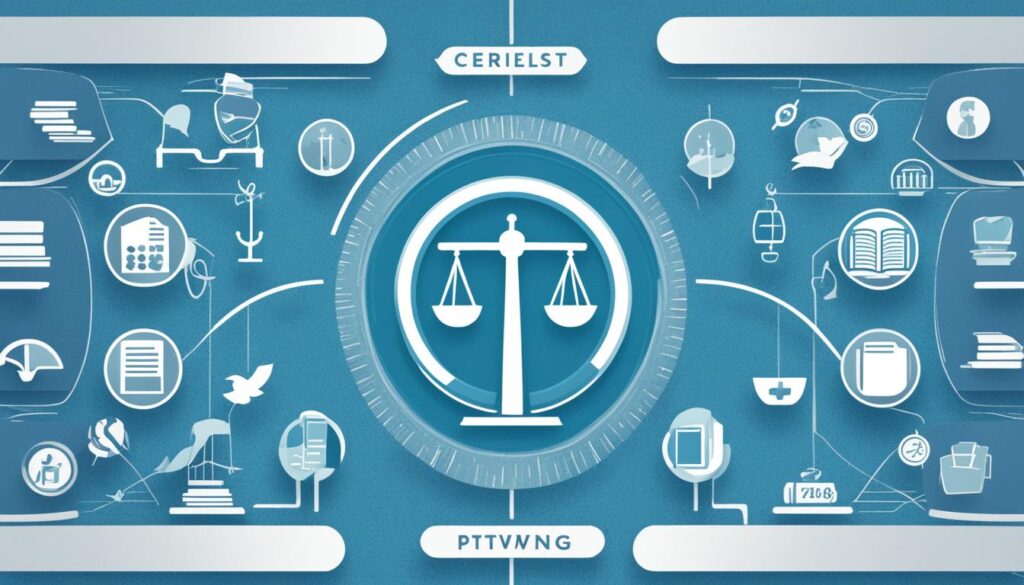
How to Determine if an IPTV Service is Legal
When choosing an IPTV service, it’s essential to make sure you’re selecting a legal provider. Here are some key factors to consider in determining the legality of an IPTV service:
- Brand Recognition: Legitimate IPTV services are often well-known brands like Netflix and Amazon Prime Video. These platforms have the necessary licenses to distribute copyrighted content legally.
- Subscription Fees: Illegal IPTV services are known for offering their services either for free or at significantly lower subscription fees compared to legal providers. Keep in mind that legal IPTV services have licensing costs, so unrealistically low fees could indicate a potential violation of copyright laws.
- Payment Methods: Be cautious of IPTV services that ask for payment in cryptocurrencies such as Bitcoin. These payment methods can be harder to track and may be used by illegal service providers to evade legal scrutiny.
- Quality and Content: Services offering a vast range of international channels or low-quality streams may be signs of illegal IPTV. Legitimate providers typically prioritize high-quality content and adhere to copyright regulations.
- Advertising and User Experience: Avoid services that bombard users with excessive pop-up ads or feature misleading buttons. Reputable IPTV providers focus on providing a seamless and enjoyable user experience without resorting to deceptive tactics.
By taking these factors into account, you can assess the legitimacy of an IPTV service and ensure that you support legal sources of entertainment. Remember, choosing a legal IPTV service not only protects you from legal implications but also supports the creators and rights holders of the content you enjoy.
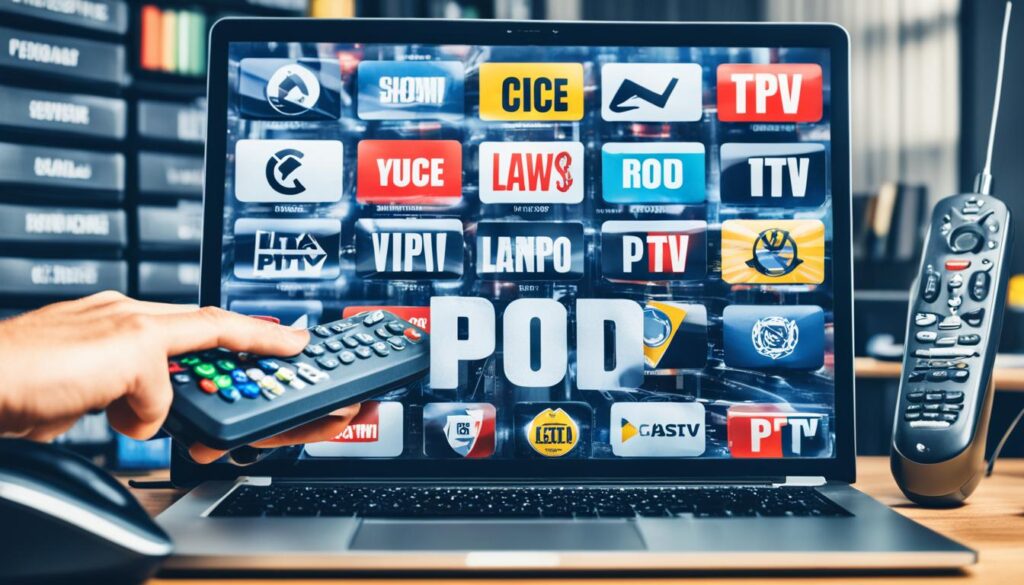
| Signs of Illegal IPTV Service |
|---|
| Offers free or significantly lower subscription fees compared to legal IPTV services |
| Requests payment in cryptocurrencies like Bitcoin |
| Provides a wide range of international channels |
| Features low-quality streams and content |
| Bombards users with excessive pop-up ads or misleading buttons |
Legal and Safety Considerations of Using IPTV
When it comes to using IPTV, legal issues and safety concerns should not be taken lightly. Understanding the potential risks and taking precautions is key to a secure and compliant IPTV experience.
Legal Issues
Using legal IPTV services is not only strongly advised but also essential to avoid legal consequences. Engaging with illegal IPTV services, which offer copyrighted content without authorization, can lead to fines and even jail time. The consequences of copyright infringement should be a significant deterrent for users seeking to access pirated content.
Safety Concerns
Aside from legal repercussions, using illegal IPTV services can have serious safety implications. Personal data protection is at stake, as users may unknowingly expose their sensitive information to hackers or scammers. Additionally, illegal IPTV services can pose device security threats, putting users at risk of malware infections and other cyberattacks.
ISP Terms of Service
It’s important to note that the usage of illegal IPTV services often violates the terms of service of Internet Service Providers (ISPs). Depending on the severity of the violation, ISPs may issue warnings, restrict services, or even terminate internet connections. To safeguard against such consequences, it is wise to adhere to your ISP’s terms of service and choose legal IPTV options.
To ensure both safety and compliance while using IPTV services, users should consider using a trusted Virtual Private Network (VPN). A VPN encrypts internet traffic and routes it through secure servers, providing an additional layer of protection for personal data and identity.

By prioritizing legal IPTV services, being mindful of safety concerns, and respecting ISP terms of service, users can enjoy a worry-free IPTV experience while supporting the entertainment industry.
Benefits and Drawbacks of IPTV
IPTV offers several benefits and drawbacks that users should consider before choosing a service.
Benefits of IPTV
- Higher Quality Content: IPTV allows users to access higher resolutions like 4K and HDR, providing a more immersive viewing experience.
- Global Reach: With IPTV, users can watch content from anywhere in the world, breaking geographical boundaries and accessing a diverse range of programming.
- Potential Advertising Revenue: For users who want to monetize their IPTV services, there is potential to generate advertising revenue by partnering with brands and displaying targeted ads to viewers.
- Growing Market Size: The IPTV market is expanding rapidly, offering users a wide variety of content options and service providers to choose from.
Drawbacks of IPTV
- Sensitivity to Packet Loss: Due to the nature of IP technology, IPTV is sensitive to packet loss and delays in network transmission. This can result in low-quality videos and buffering issues, affecting the viewing experience.
- Network Improvements: To ensure a seamless IPTV experience, network infrastructure needs to be robust and capable of handling high-quality streaming. In regions with limited internet connectivity, network improvements are necessary to deliver uninterrupted IPTV services.
Users should carefully weigh the benefits and drawbacks of IPTV when considering a service. While the higher quality content, global reach, and potential advertising revenue are attractive features, it is important to be aware of the sensitivity to packet loss and the need for network improvements to ensure a smooth viewing experience.
| Benefits of IPTV | Drawbacks of IPTV |
|---|---|
| Higher Quality Content | Sensitivity to Packet Loss |
| Global Reach | Network Improvements |
| Potential Advertising Revenue | |
| Growing Market Size |
Challenges and Considerations for IPTV Users and Providers
IPTV users and providers face a range of challenges and considerations in the ever-evolving landscape of Internet Protocol Television. Whether you’re a user trying to find a reliable and reputable service or a provider striving to meet the demands of a competitive market, various factors come into play.
Diverse Providers and Different Formats
One challenge for IPTV users is the diverse range of providers available in the market. With numerous options to choose from, users must navigate through various offerings and select a provider that meets their specific needs. Additionally, different IPTV formats exist, including live TV, video on demand, and time-shifted TV. Users must understand these formats and choose the most suitable one for their viewing habits.
Availability of Pirated Content
The availability of pirated content poses challenges for both users and IPTV providers. Pirated content undermines revenue for legitimate providers and raises legal risks for users who access unauthorized content. It is essential for users to support legal IPTV services and respect intellectual property rights by avoiding pirated content.
Network Improvements and Rising User Demand
Network infrastructure plays a critical role in delivering high-quality IPTV services. As the demand for IPTV continues to rise, providers must ensure that their networks are capable of handling increased bandwidth requirements. Network improvements are particularly crucial in regions with limited internet connectivity, as users need reliable and fast connections to enjoy seamless IPTV experiences.
Competition with Traditional TV Providers
Providers face the challenge of competing with traditional TV providers who offer a wide range of channels and established infrastructure. To attract and retain users, IPTV providers must offer compelling content, competitive pricing, and attractive features. In addition, providers must continuously innovate and adapt to changing user preferences to stay ahead in the competitive market.
Regulatory and Legal Considerations
Compliance with regulatory and legal requirements is an essential consideration for both IPTV users and providers. Copyright laws and privacy regulations must be followed to protect intellectual property rights and user data. Providers must obtain the necessary licenses and permissions to distribute copyrighted content legally, while users should choose legal IPTV services to avoid potential legal consequences.
| Challenges | Considerations |
|---|---|
| Diverse Providers | Choose reliable and reputable providers |
| Different Formats | Understand and select suitable IPTV formats |
| Availability of Pirated Content | Avoid pirated content to support legal sources |
| Network Improvements | Ensure reliable and fast connections for optimal IPTV experiences |
| Rising User Demand | Meet the increasing bandwidth requirements of users |
| Competition with Traditional TV Providers | Offer compelling content, competitive pricing, and attractive features |
| Regulatory and Legal Considerations | Comply with copyright laws and privacy regulations |
Conclusion
In conclusion, Internet Protocol Television (IPTV) has become a popular method for accessing television content over the internet. There are legal and illegal IPTV services available, each with its own implications for users and content creators.
Legal IPTV services, such as Netflix and Amazon Prime Video, offer a wide range of licensed content and operate in compliance with copyright laws. By choosing legal IPTV services, users can enjoy their favorite TV shows and movies while supporting the creators and rights holders. Legal IPTV services contribute to a thriving and sustainable entertainment industry.
On the other hand, illegal IPTV services pose significant legal risks. These services infringe on copyright and distribute copyrighted content without authorization. Users who access illegal IPTV services may face legal consequences, including fines and potential imprisonment. Moreover, by using illegal IPTV services, users unintentionally contribute to the decline of legal sources of entertainment.
It is crucial to support legal sources of entertainment and use legitimate IPTV services. By doing so, users can access a wide range of licensed content while ensuring compliance with copyright laws. Additionally, supporting legal IPTV services helps maintain an industry that fosters creativity, innovation, and the production of high-quality content.
Remember, when it comes to IPTV, choose legal services to enjoy your favorite shows and movies while supporting the creators and rights holders.
FAQs
Are you curious about IPTV and its legal aspects? Here are answers to some frequently asked questions that can help you navigate the world of IPTV usage.
1. Is IPTV legal? IPTV itself is a legal technology, but the legality of specific services depends on whether they obtain the proper licenses. It’s important to choose legal IPTV providers, like Netflix and Amazon Prime Video, to avoid any legal ramifications.
2. How can I determine if an IPTV service is legal? Legitimate IPTV services often charge subscription fees and accept standard payment methods, such as credit cards. On the other hand, illegal IPTV services may offer their services for free or at significantly lower prices. Be cautious of suspiciously low prices and payment methods like cryptocurrencies.
3. What are the legal consequences of using illegal IPTV services? Using illegal IPTV services can lead to legal issues, including copyright infringement. Different countries have their own laws surrounding illegal IPTV, and penalties can range from fines to prison sentences.
4. What safety considerations should I be aware of when using IPTV? Safety concerns arise when using illegal IPTV services, as your personal data may be at risk of being sold to hackers or scammers. Additionally, illegal services may expose your devices to security threats. To ensure safety, consider using a trusted VPN (Virtual Private Network) while accessing IPTV services.
By understanding the legal aspects of IPTV usage and making informed decisions, you can enjoy IPTV content while supporting legal sources of entertainment.
FAQ
What is IPTV?
How does IPTV work?
What is the difference between legal IPTV providers and illegal IPTV services?
What are the legal consequences of using illegal IPTV services?
How can I determine if an IPTV service is legal?
Are there any safety concerns with using IPTV?
What are the benefits and drawbacks of IPTV?
What challenges do IPTV users and providers face?
How can IPTV users support the entertainment industry?
